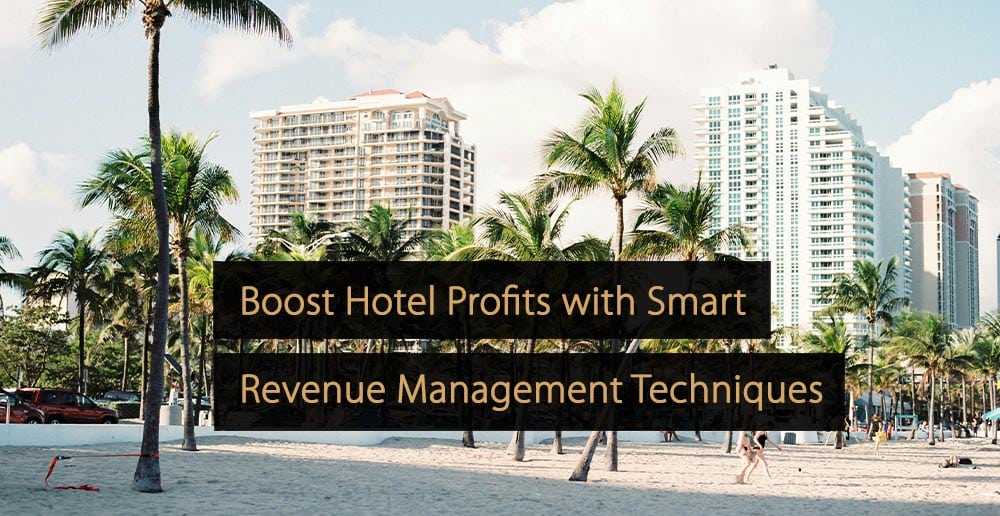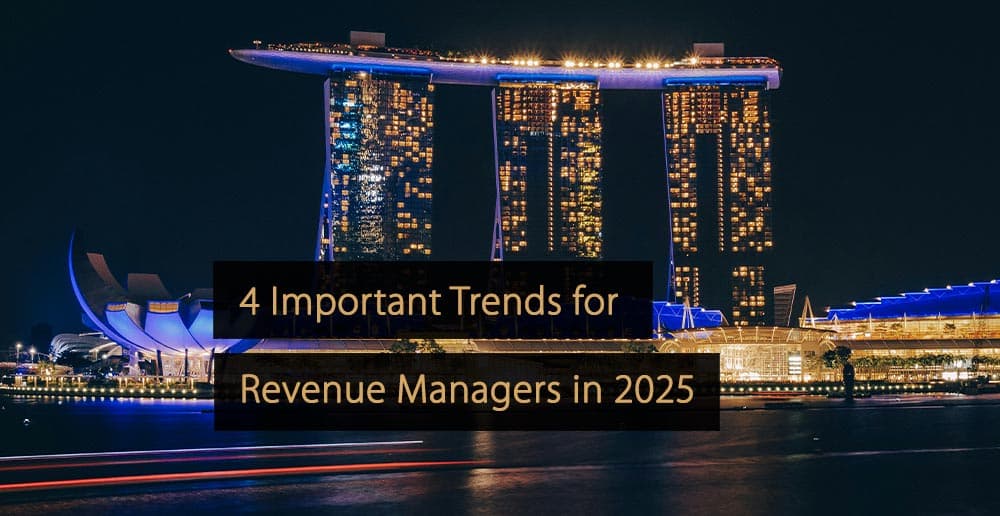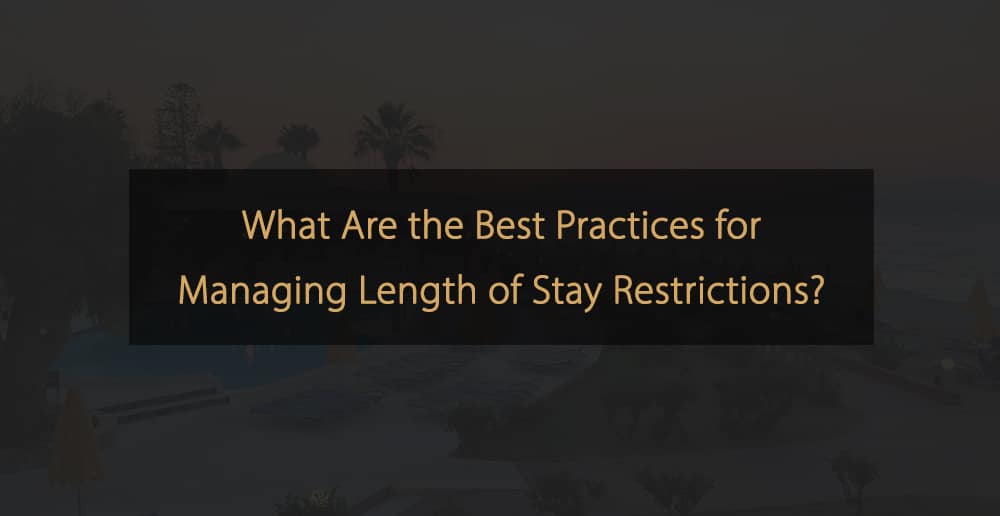Question for Our Revenue Management Expert Panel:
The importance of Ancillary Revenue Management is growing. What ARM strategies can be used to increase room revenue / revenue per guest?
(Question proposed by Pablo Torres)
Industry Expert Panel
Our Industry Expert Panel exists out of professionals within the hospitality & travel Industry. They have comprehensive and detailed knowledge, experience in practice or management and are forward-thinking. They are answering questions about the state of the industry. They share their insights on topics like revenue management, marketing, operations, technology and discuss the latest trends.
Our Revenue Management Expert Panel
- Theresa Prins – Founder, Revenue Resolutions
- Nikhil Roy – Revenue & Pricing Manager, Key Hospitality B.V.
- Daniel Feitosa – Revenue Management Specialist
- Chaya Kowal – Director of Revenue Management, Potato Head Family
- Krunal Shah – Cluster Director of Revenue, Dorsett Hospitality International
- Tanya Hadwick – Group Revenue & Yield Leader, SunSwept Resorts
- Sergio Sartori – Group Senior Manager Revenue, Ruby GmbH
- Daphne Beers – Owner, Your-Q Hospitality Academy
- Heidi Gempel – Founder, HGE International Pte Ltd
- Pablo Torres – Hotel Consultant, TSA Solutions
- Edyta Walczak – Revenue Management Expert
- Mariska van Heemskerk – Owner, Revenue Management Works
- Heiko Rieder – Revenue Management Professional
- Silvia Cantarella – Revenue Management Consultant, Revenue Acrobats
- Massimiliano Terzulli – Revenue Management Consultant, Franco Grasso Revenue Team
- Ask Our Panel a Question
- Join Our Expert Panel
“I try to promote what I call ‘keeping the money in-house’. To increase room revenue through demand, we can either offer a discount or a value add. I recommend you take the value of the discount and turn it into a revenue-generating value add. For example, if you were to give a 10% discount and this amounts to $20, why not keep your rate, but offer a $20 voucher to be spent on drinks in the restaurant with their meal.
The guest enjoys better value for their money and the hotel can keep the revenue in-house. Plus, if the guest spends this value-add, they will also buy dinner to qualify for it and in turn grow the revenue per available guest.”
“Examples of Ancillary Revenue Management can be:
- Web shop (can be connected with the hotel WiFi, enabling guests to order items and add it to their bill, e.g., breakfast delivered to room, room service, food & beverage, etc.)
- Late check-out and early check-in
- Room upgrade (a week prior to check-in, hotels can email their guests offering the chance to upgrade their reservation for a fee. This can be used when the demand is low)
- Partnering with establishments located around the hotel, e.g., spa, a salon, restaurant/cafe, travel agency, car rental service, etc.
- Hotel merchandise and souvenirs, gift boxes
- Areas such as meeting rooms can be rented out to companies who are looking for short term office spaces
- Create packages for guests that include F&B, spa, recreational activities, etc.
- Entertainment on-demand (e.g., Netflix and a subscription to Spotify) for instant access to quality content and music apart from the regular TV channels that are complimentary”
“There are many opportunities to grow ancillary revenue with guests in-house. The upselling strategy is a real opportunity to be managed. How many suites are empty when guests could avail of them if they receive an attractive offer to fit their needs?
Front office staff being trained in Sales to understand guests and the products they can offer can be useful to make guests aware of the F&B environments. If we have also some incentives to the staff based on Ancillary Revenue, we are creating a Revenue mindset amongst all the staff. Every team member needs to know the answers to these questions: What brings this guest here? What we can do to provide them with a better experience?
Let’s think about it. I’ve seen great Front Office staff sell suites based on a good understanding of the person in front of them and a smooth check-in conversation.”
“Over the past years, Revenue Management has been evolving from the traditional Room Revenue Management to a Total Revenue Management (TRM) approach. As hotels are now starting to re-open after closure due to the pandemic, cost control and effective staffing are one of the main focuses. Directly related to this is “Ancillary Revenue Management” (ARM).
ARM consists of optimizing every revenue-generating stream of a hotel. It is both about controlling the costs and optimizing / maximizing revenue generated in all sectors. It consists of looking into the small loopholes and all those untapped profit-generating potentials. The same principles applied to rooms can also be applied to other revenue-generating areas.
ARM is not only about packaging other elements like F&B or Spa with the rooms; but it means going into real detail about every revenue-generating point of the hotel; like Events space optimization (revenue per available sqm, Revenue per participant, enquiry conversion), F&B (seat efficiency, Revenue and Profit per available seat per hour, inhouse and external guests), Beach club (daybeds bookings and efficiency per hour, Revenue per day bed and per guest), Spa and wellness (Revenue per available treatment hour) and also look into factors like peak hour, time of the day, day of the week vs weekend, inhouse guests and external guests, etc.
Creative thinking:
The above mentioned elements are still the standard way of doing things in ARM. If we would like to think outside of the box, we would go one step further and look into more creative / innovative solutions. For example:
- Sell rooms for a few hours. Some airport hotels are already doing this and city hotels with large inventories could also do something like this for business travellers who need to rest and recharge between meetings (when they are on a day trip for example).
- Showroom for rent – maybe there is a room that is too noisy for someone to sleep in (too close to a restaurant for example) but it would be perfect for an event. Instead of keeping it on an “out of order” status, it could probably be used by people who need a temporary showroom (for their jewellery business for example) / or travelling jewellers.
- Special rates for rooms can be offered for day guests at the resort’s Beach club for example. For resorts with a casino or a golf course, they can offer additional services to their guests based on consumption. If rainy days affect the beach club revenue, what could be done about it? A special offer for rainy days combining spa maybe?
Profit management:
I think it is also the right time to start analyzing (if you are not already doing it), the COS (Cost of Sale) per segment / channel. How much are you spending on each OTA for example vs the Revenue and profit that you are generating? This leads to the NRevPar – Net Revenue per room and allows you to account for expenses. A lot of hotels are shifting KPIs towards GOPAR – Gross Operating Profit per room and TRevPAR – Total Revenue per Room.
Revenue Management is not all about numbers and analytics:
Especially right now, it is important to understand what the customer wants. For example, Booking.com adapted by launching a travel sustainable badge.
Technology:
An integrated system across all POS would enable the hotel to collect and analyze data more easily and take correct actions with regards to optimizing total revenue generated.
A holistic approach to revenue management:
Build a Revenue Management Culture across the whole hotel / company. It is important for everyone to understand the principles of Revenue Management in order to work together as a team.
ARM doesn’t stop at a Revenue Manager’s role! Upselling or cross-selling for example can be done at every level and at different stages (pre-arrival, upon check-in and also during the stay). Staff incentives can be put into place for added motivation. There are various ways to increase a guest’s spend during the stay – special offers for slow hours, spa deals, etc.
In summary, every hotel is different and you can be creative in the ways you approach ARM.”
“For me, Ancillary Revenue Management is a part of Total Revenue Management. Hotels/Resorts having conferencing, meetings and events, Weddings, Restaurant & Bar facilities all depend heavily on Ancillary Revenue Management.
Profit margins on such revenues generated are much higher, which helps achieve more revenue per guest. It’s very important to do displacement analysis for Groups including Ancillary Revenue depending on the “day of the week” pattern. This has a direct impact on your TrevPAR and GOPPAR. It also helps hotels/resorts to diversify their revenue streams. It is very important to identify the services that add value to your package offered.
For example, I previously worked at a resort and we were heavily dependent on Ancillary Revenue streams and rooms were sold with packages. Obviously, I would prefer a guest spending on F&B services in the hotel/resort against a guest having a room with breakfast. But again, this depends on the requirements and seasonality of the hotel/resort at different times of the year.”
“An interesting question when working in ultra inclusive resorts, as it takes some real thought on how you can increase Ancillary Revenue. It comes down to what you have available to offer at additional costs, and what the guest is prepared to spend. For many, the aim of an all-inclusive is to have already budgeted the cost of the trip. From an F&B perspective, some examples include high-end specials, such as surf and turf with lobster and steak, champagne, high-end wines and exclusive wine paring menus. We typically use a variety of methods to update the guests, i.e., from using the in-room tablets to the team upselling.
As a resort, we are lucky to have great spa facilities, where additional treatments can be suggested. We also have various water sports and one-on-one classes on offer. Having spent time looking at all the costings, we are also aware of when and how to mix and match with the rooms to secure the best results. It does however, all come down to the team’s engagement, how familiar they are, their level of comfort in suggesting items to the guests and whether or not they are incentivised to make such suggestions.”
“You could offer an extended service, e.g., in-room service or in F&B service. Furthermore, small unused conference rooms could be offered as co-working spaces. Also, unused space could be offered as an event stage for local artists.”
“Packages that are focused on local knowledge and products, sustainability initiatives and health & safety packages (in-room dining) can drive revenue/decrease cost. One example is the “hotel for trees” initiative where you donate part of the savings in cleaning costs to planting trees if a guest decides to skip daily cleaning, increasing total NET results.”
“The last 18 months have been a textbook case study on Disruptive Innovation. The industry’s business model was not just disrupted, it was challenged to the core as most travel stopped. Covid-19 forced the hoteliers to consider their relevance in local and domestic markets. Across some of the major cities in South East Asia, creative packages that offer amazing in-room dining experiences, “work from hotel” packages and hotel quarantine packages have been quite popular. Day-cation packages have attracted local guests that were not previously part of the customer segments. F&B delivery and take-away offers have allowed many hotels to keep some of their associates during the worst parts of the pandemic. We have also seen online cocktail classes, online birthday or office parties catered by exquisite hoteliers.
Will these revenue sources retain their importance? It will come down to the profitability of those revenue streams. Hoteliers and owners need to review if the service being offered is sustainable when ‘normal’ hotel services resume. The other big factor is if hoteliers are able to continue innovating their offerings and adapting them effectively to the new hospitality landscape. Going forward, proactive and intentional innovation needs to be incorporated into our processes and our business model.”
“Consider the entire customer journey. From the moment the guest books, we must try to engage with them to make sure their stay is personalized to the maximum, which should mean better service, a happier guest and more revenue for the property. From pre-arrival engagement (early check-in, special amenities, parking, transfer), to in-stay (upsell, cross-sell services from other departments), to departure (late check-out, transfer, picnic, follow up, discounts for next booking), it´s a cycle with many opportunities.
One of my resort clients has recently appointed a “Pre-arrival Manager” specifically to improve that relation between booking time and arrival, thereby avoiding cancellations, disappointment and generally improving the guest experience = revenue generated.”
“As the hotel industry and guests’ expectations are constantly evolving, it’s vital to have a diverse strategy that includes many revenue streams. It’s become more common for Revenue Managers to not only manage the top line of room revenue, but to also focus on Trev Par and cross-department revenues. This includes food and beverage sales, parking, events, meetings, spa, amenities and other miscellaneous income. This holistic approach to revenue has a positive impact on the hotel’s commercial performance but can also positively impact guests’ satisfaction by offering a wider choice of services and enhancements.
Ancillary Revenue Management:
- Attracts new guests looking for a bespoke and memorable experience
- Creates opportunities for marketing campaigns and promotions
- Diversifies guest offerings
- Helps you to beat out the competition
- Allows you to grow alternative sources of revenue rather than just rooms alone
Examples:
- Food – Room service, on-site restaurants, Private Dining events
- Beverage – The hotel bar or minibar, drinks receptions
- Entertainment – Tickets to events including live sports, concerts, and theatre
- Tours and activities – day trips and tickets to local attractions
- Upgrades – Upgraded hotel rooms, rooms with a view, high floor etc.
- Retail – Purchases made from on-site shops and outlets
- On-site services – Access to the hotel spa, swimming pool, hairdresser
- Early arrival and late check-out”
“In order to increase your Ancillary Revenue Management, sufficient training of your hotel staff (Front Desk / Reservations / Restaurant / Banqueting, etc.) is highly recommended. Think about breakfast with the room, a mini-bar package upon check-in, dinner for the entire group, a late check-out or perhaps an extra break during the meeting?
ARM is present throughout every department with revenue purposes and every employee has a chance to sell ancillary services during their shift. Yes, even Housekeeping! Teach them what sells well, what brings in the highest net earnings (i.e., which items bring in the best margins) and teach them how to sell!”
“In the current climate, it’s even more important that the income per guest is maximised, especially when most regions are still experiencing declining average rates as the result of low demand. The hotel industry reacted quite rightly with an increased focus on driving more income from Ancillary Revenues (AR), preferably through the cost-neutral direct channels, as opposed to OTAs where sales of AR will be subject to commissions.
Before elaborating on examples it might be good to look at some considerations:
- Be mindful that products producing AR added to the booking funnel can distract the flow and will have an impact on conversion rate. It is therefore recommended to sell the items after the sale of the bedroom is closed. If technology permits, this could be embedded into the “Thank you“ message. Alternatives are emails, text or chat messages sent prior to arrival. For repeat guests, the items offered should be customized to their requirements based on historic profile information.
- When selling additional items on the phone, be aware of the process that comes with it. For instance, when offering a reservation at the hotel restaurant or in-room dining, the reservation agents need access to the availability of the restaurant and also be able to place the reservation, including special requests that might come with it.
Naturally, examples to drive ancillary revenues should be all services the hotel offers to begin with, i.e., the restaurant reservation, spa treatments, in-room dining experiences, reservations to any hotel events (e.g., happy hour). Another consideration can be given to external items such as theatre tickets, guided city tours or entry to local attractions. As these items don’t drive any revenues for the hotel, there should be some sort of brokerage agreement in place with the local partners or ticket dealers.
In the context of ancillary revenues, upselling tactics to premium room types can also be addressed. Customers who have not selected a premium room type during the initial purchase can request a premium room type at a discounted rate closer to the arrival day. However, to ensure that discounts are only granted on days where there are premium rooms available, the customer will only get a confirmation on the day of arrival. Some vendors in this field such as Upsellguru offer this with a “name your own price“ concept where the consumer can easily move the regulator to the desired price on the pre-stay email. Upselling tools are usually easy to deploy and some don’t charge setup fees, so it’s fairy risk-free to try it out.
In summary, initiatives aiming at increasing spend per guest are definitely a “must“ for every hotel with more services than just bedrooms. In addition, the extra effort it takes to process ancillary items as well as the mitigation of risk from human errors should be taken into account when selecting ancillary items.”
“Revenue Management is about understanding the expectations and needs of the customers and adapting to them, creating value for the customer and revenue for the hotel. Customers have 2 wallets: the one they use to pay for the trip (Hotel, transportation, etc.) and the one they use for leisure during the trip (for extras and fun).
Let’s focus on this second wallet and start by understanding who our customers are, why they travel, why they have chosen us and what they expect. We must not apply the one-size-fits approach to ancillary sales but we must create a matrix of ancillary services that target a specific segment’s needs. The services that would be offered to the corporate segment (e.g., cross-selling a dinner at the Bar) would not be offered to the family segment (e.g., dinner at the restaurant with a complimentary children’s menu).
We also must try to break out of the usual platitudes and truly create sales experiences that are attractive. We can use the bundling technique, e.g., room upselling + Restaurant voucher; Private AperiSPA with Champagne (aperitif in spa), or dinner with an exclusive table in the Privé or on the Terrace. Let’s look at the hotel with new eyes: what are our strengths, where can we attract demand, sell extra and monetize? How can we be appealing to our guests?”
“Restaurant, bar, spa, minibar, room service and meeting rooms are just some examples of ancillary revenues that are often not exploited to their full potential by those managing an accommodation facility. It is well known that in some large resorts ancillary revenues can affect up to 50% of total revenue.
However, it is not always necessary to internally produce ancillary services in order to generate ancillary revenues. Sometimes it is possible to make agreements with local external operators (restaurants, tour agencies, car rental services, bike rentals, spas etc.) to increase revenues, the average customer’s spending and more generally the satisfaction and their perception of the service, and therefore get excellent reviews. Ancillary services can also vary according to the destination. Excursions are quite popular in the mountain resorts, as well as services for families with children at beach hotels, or experiences related to art, gastronomy and culture in key cities.
A concrete example of implementing ancillary revenues in the property is a tailor-made package, with additional services, linked to different room types and customers where the goal is to sell experiences. If your property has a restaurant, there are several ways to increase the conversion rate of hotel guests into restaurant guests. Here are some examples:
- Attractive offers on website and booking engine
- Implement specific sales techniques such as cross-selling emails (there is software available to automate the process)
- Sale at the front office
- Communication material in common areas (promotional billboards, etc.)
- Email marketing through the hotel wi-fi network
- Chatbots and messaging systems
Ideally, ancillary services should be linked to different moments in the purchasing process with each touchpoint offering different services that naturally complement the offer. Before the purchase you can offer certain services, whereas during and after the purchase you might offer others.
Segmenting messages based on the people you are targeting significantly increases your chances of success. In this process, it is essential to involve the staff and ensure that they are all aligned to the offer of ancillary services. Everyone needs to know the additional services provided, and everyone needs to be trained to sell them to customers in the right way. Hotels have a huge competitive advantage over OTAs: the chance to sell services and experiences that it’s not possible to buy on OTAs.”
Ask a Question & Join Our Expert Panel
Would you like a question to be answered by our Industry Expert Panel? Or would you like to join our community of experts and share your experience, insights, and knowledge with fellow industry professionals? Via the buttons below you can submit a question or submit a request to become part of our expert panel.
More Tips to Grow Your Business
Revfine.com is the leading knowledge platform for the hospitality and travel industry. Professionals use our insights, strategies, and actionable tips to get inspired, optimize revenue, innovate processes, and improve customer experience.Explore expert advice on management, marketing, revenue management, operations, software, and technology in our dedicated Hotel, Hospitality, and Travel & Tourism categories.






















Leave A Comment